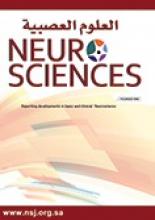Abstract
Apomorphine and certain ergot alkaloids (bromocriptine, lisuride and pergolide) have been available for several decades; for the last few years, they were joined by newer dopamine agonists (cabergoline, pramipexole and ropinirole) most of them are non-ergolines. Each of these dopamine agonists has its own pharmacological characteristics and occupies a place in the pharmacotherapy of Parkinsons disease. In this evidence-based review, emphasis is put on the clinical efficacy of dopamine agonists in early and advanced Parkinsons disease, and where possible comparative evidence regarding their efficacy and safety is provided. In addition, their clinical pharmacokinetics, adverse effect profiles and most relevant interactions will be summarized.
- Copyright: © Neurosciences
Neurosciences is an Open Access journal and articles published are distributed under the terms of the Creative Commons Attribution-NonCommercial License (CC BY-NC). Readers may copy, distribute, and display the work for non-commercial purposes with the proper citation of the original work.






